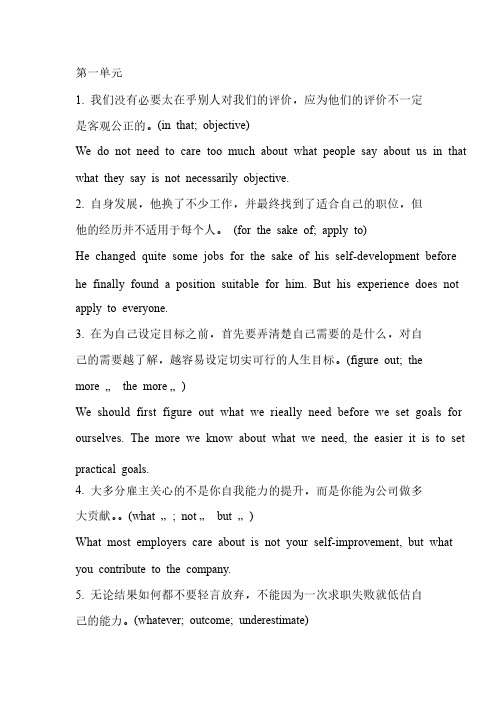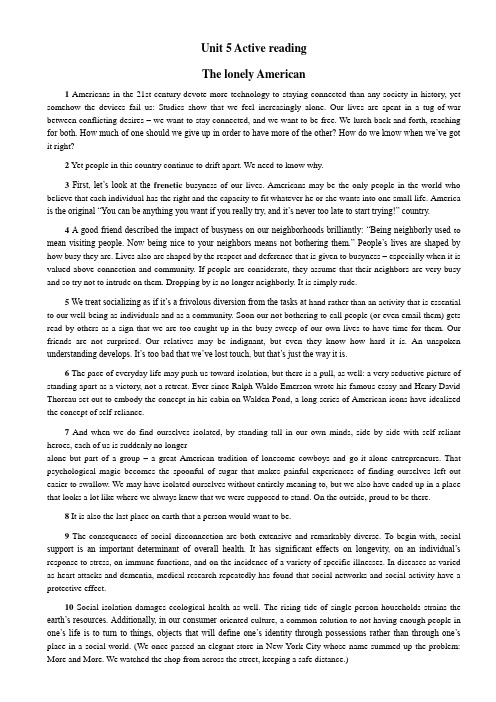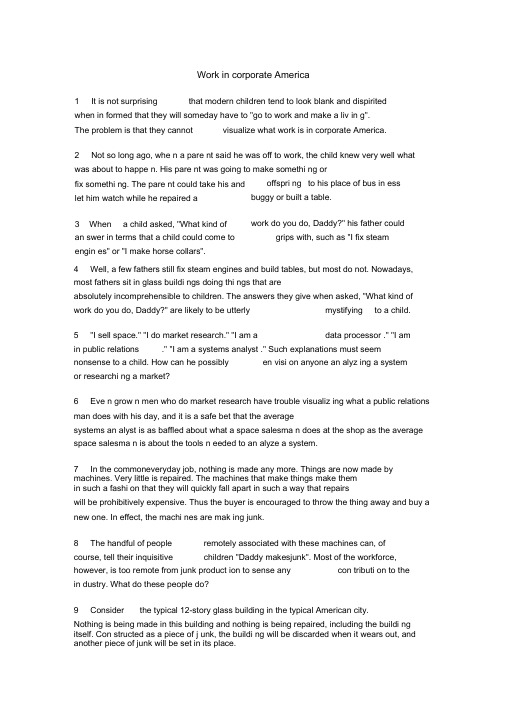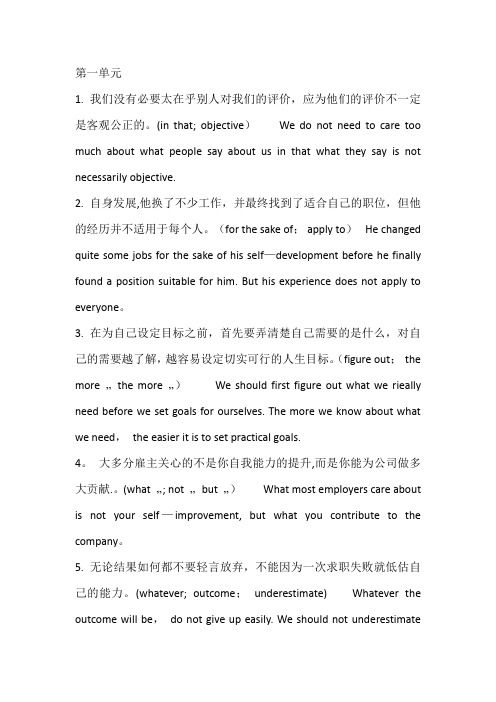新视界大学英语综合教程3课文翻译终极版
全新版大学英语综合教程3课文原文及翻译

全新版大学英语综合教程3课文原文及翻译《全新版大学英语综合教程 3 课文原文及翻译》大学英语学习对于许多学生来说是提升语言能力和拓展国际视野的重要途径。
全新版大学英语综合教程 3 更是其中的重要组成部分。
以下将为您呈现部分课文的原文及对应的翻译,希望能对您的学习有所帮助。
课文一:The Human Touch原文:John Blanchard stood up from the bench, straightened his Army uniform, and studied the crowd of people making their way through Grand Central Station翻译:约翰·布兰查德从长凳上站起身来,整了整军装,审视着穿过中央车站的人群。
原文:He looked for the girl whose heart he knew, but whose face he didn't, the girl with the rose翻译:他在寻找那个他明知其心却不知其貌的女孩,那个带着玫瑰的女孩。
原文:His interest in her had begun thirteen months before in a Florida library翻译:他对她的兴趣始于十三个月前在佛罗里达州的一家图书馆里。
原文:Taking a book off the shelf he found himself intrigued, not with the words of the book, but with the notes penciled in the margin 翻译:他从书架上取下一本书,发现自己感兴趣的不是书中的文字,而是写在页边空白处的铅笔字批注。
原文:The soft handwriting reflected a thoughtful soul and insightful mind翻译:那柔和的笔迹反映出一个深思熟虑、富有洞察力的灵魂。
新视界大学英语综合教程3课文翻译Unit1-8

Unit 1Active reading独立思考直到现在,独立思考仍然是一种激进的行为。
独立思考本应该是一种普遍的行为,但事实并非如此。
我们社会的每一次重大进步都源于独立思考。
然而,在大多数圈子里,尤其是在我们生活中的重要场所——如家庭、学校以及大部分工作场所——独立思考受到人们的质疑。
有些机构甚至故意压制独立思考,把它视作危险行为。
在一次晚会上,有一位客人问起我酝酿中的一本书的主题,他让我想起了这个令人悲哀的事实。
我告诉他这本书是关于人们如何相互帮助,培养独立思考能力的。
“啊,天哪!”他说,“我觉得这个主题不怎么好,我更希望人们按指令行事。
”后来我才发现他是一家大公司的第四代掌门人,而这家公司是世界上最大的石油公司之一。
“……要把我们公司发展成一个典范的工作环境,其中各层次的人都能够独立思考。
”你最后一次看到包含上述字眼的机构愿景陈述是在什么时候?而且,最后一次有人问你:“你能说说真心话吗?真心话!”,然后等着你最终给出充分的答案,那又是在什么时候?我们对于缺乏独立思考已习以为常了。
很少有人受到鼓励进行独立思考,更别提接受相关的训练,就连他们的老师、父母和老板也是如此。
而且他们的老师、父母和老板也是如此。
(我们也许已经知道要尊敬像苏格拉底这样的思想家,但同时我们也知道,他正是因为独立思考而被雅典城判处死刑,服毒而亡——这绝非是对独立思考完完全全的鼓励。
)可是,偶尔我们确实能遇到一位真心想让我们发展独立思考能力的人。
他们让我们对独立思考的重要性有了浅略的认识。
我13 岁时被安排学习一门高等代数课程。
这门课的老师曾因迫使学生思考而遭到学生的中伤。
上第一节课时,她站在黑板前说道:“在你们面前的纸上写出一个数字之和。
”全班35个少男少女都愣愣地看着她。
她把要求又重复了一遍:“写出一个数字之和。
”我记得当时握铅笔的手都攥出了汗。
有几个人把头低下,动笔写起来。
我纳闷他们究竟在写些什么。
我看见跟我隔着过道的那个女同学向前探了一下身子,从前座男生的肩膀上方偷窥他正在草草写些什么。
新视界大学英语综合教程第三册Unit4Activereading课文及翻译

新视界大学英语综合教程第三册Unit4Activereading课文及翻译Unit 4 Active readingWork in Corporate America1 It is not surprising that modern children tend to look blank and dispirited when informed that they will someday have to “go to work and make a living”. The problem is that they cannot visualize what work i s in corporate America.2 Not so long ago, when a parent said he was off to work, the child knew very well what was about to happen. His parent was going to make something or fix something. The parent could take his offspring to his place of business and let him watch while he repaired a buggy or built a table.3 When a child asked, “What kind of work do you do, Daddy?” his father could answer in terms that a child could come to grips with, such as “I fix steam engines” or “I make horse collars”.4 Well, a few fathers still fix steam engines and build tables, but most do not. Nowadays, most fathers sit in glass buildings doing things that are absolutely incomprehensible to children. The answers they give when asked, “What kind of work do you do, Daddy?” are likely to be utterly mystifying to a child.5 “I sell space.” “I do market research.” “I am a data processor.” “I am in public relations.” “I am a systems analyst.” Such explanations must seem nonsense to a child. How can he possibly envision anyone analyzing a system or researching a market?6 Even grown men who do market research have trouble visualizing what a public relations man does with his day, and itis a safe bet that the average systems analyst is as baffled about what a space salesman does at the shop as the average space salesman is about the tools needed to analyze a system.7 In the common everyday job, nothing is made any more. Things are now made by machines. Very little is repaired. The machines that make things make them in such a fashion that they will quickly fall apart in such a way that repairs will be prohibitively expensive. Thus the buyer is encouraged to throw the thing away and buy a new one. In effect, the machines are making junk.8 The handful of people remotely associated with these machines can, of course, tell their inquisitive children “Daddy makes junk”. Most of the workforce, however, is too remote from junk production to sense any contribution to the industry. What do these people do?9 Consider the typical 12-story glass building in the typical American city. Nothing is being made in this building and nothing is being repaired, including the building itself. Constructed as a piece of junk, the building will be discarded when it wears out, and another piece of junk will be set in its place.10 Still, the building is filled with people who think of themselves as working. At any given moment during the day perhaps one-third of them will be talking into telephones. Most of these conversations will be about paper, for paper is what occupies nearly everyone in this building.11 Some jobs in the building require men to fill paper with words. There are persons who type neatly on paper and persons who read paper and jot notes in the margins. Some persons make copies of paper and other persons deliver paper. There arepersons who file paper and persons who unfile paper.12 Some persons mail paper. Some persons telephone other persons and ask that paper be sent to them. Others telephone to ascertain the whereabouts of paper. Some persons confer about paper. In the grandest offices, men approve of some paper and disapprove of other paper.13 The elevators are filled throughout the day with young men carrying paper from floor to floor and with vital men carrying paper to be discussed with other vital men.14 What is a child to make of all this? His father may be so eminent that he lunches with other men about paper. Suppose he brings his son to work to give the boy some idea of what work is all about. What does the boy see happening?15 His father calls for paper. He reads paper. Perhaps he scowls at paper. Perhaps he makes an angry red mark on paper. He telephones another man and says they had better lunch over paper.16 At lunch they talk about paper. Back at the office, the father orders the paper retyped and reproduced in quintuplicate, and then sent to another man for comparison with paper that was reproduced in triplicate last year.17 Imagine his poor son afterwards mulling over the mysteries of work with a friend, who asks him, “What’s your father do?” What can the boy reply? “It beats me,” perhaps, if he is not very observant. Or if he is, “Something that has to do with maki ng junk, I think. Same as everybody else.”在美国大公司工作1 要是有人跟现在的孩子说他们长大后要“去工作以谋生”,他们往往会表现出一脸的茫然和沮丧,这并不奇怪。
新视界大学英语综合教程3课文翻译终极版

第一单元第一单元1. 我们没有必要太在乎别人对我们的评价,应为他们的评价不一定是客观公正的。
(in that; objective) We do not need to care too much about what people say about us in that what they say is not necessarily objective. 2. 自身发展,他换了不少工作,并最终找到了适合自己的职位,但他的经历并不适用于每个人。
他的经历并不适用于每个人。
(for the sake of; apply to) He changed quite some jobs for the sake of his self-development before he finally found a position suitable for him. But his experience does not apply to everyone. 3. 在为自己设定目标之前,首先要弄清楚自己需要的是什么,对自己的需要越了解,越容易设定切实可行的人生目标。
(figure (figure out; out; out; the the more … the more …) We should first figure out what we rieally need before we set goals for ourselves. The more we know about what we need, the easier it is to set practical goals. 4. 大多分雇主关心的不是你自我能力的提升,而是你能为公司做多大贡献。
(what …; not … but …) What most employers care about is not your self-improvement, but what you contribute to the company. 5. 无论结果如何都不要轻言放弃,不能因为一次求职失败就低估自己的能力。
新视界大学英语综合教程第三册Unit 5 Active reading课文及翻译

Unit 5 Active readingThe lonely American1 Americans in the 21st century devote more technology to staying connected than any society in history, yet somehow the devices fail us: Studies show that we feel increasingly alone. Our lives are spent in a tug-of-war between conflicting desires – we want to stay connected, and we want to be free. We lurch back and forth, reaching for both. How much of one should we give up in order to have more of the other? How do we know when we’ve got it right?2 Yet people in this country continue to drift apart. We need to know why.3 First, let’s look at the frenetic busyness of our lives. Americans may be the only people in the world who believe that each individual has the right and the capacity to fit whatever he or she wants into one small life. America is the original “You can be anything you want if you really try, and it’s never too late to start trying!” country.4 A good friend described the impact of busyness on our neighborhoods brilliantly: “Being neighborly used to mean visiting people. Now being nice to your neighbors means not bothering them.” People’s lives are shaped by how busy they are. Lives also are shaped by the respect and deference that is given to busyness – especially when it is valued above connection and community. If people are considerate, they assume that their neighbors are very busy and so try not to intrude on them. Dropping by is no longer neighborly. It is simply rude.5We treat socializing as if it’s a frivolous diversion from the tasks at hand rather than an activity that is essential to our well-being as individuals and as a community. Soon our not bothering to call people (or even email them) gets read by others as a sign that we are too caught up in the busy sweep of our own lives to have time for them. Our friends are not surprised. Our relatives may be indignant, but even they know how hard it is. An unspoken understanding develops. It’s too bad that we’ve lost touch, but that’s just the way it is.6 The pace of everyday life may push us toward isolation, but there is a pull, as well: a very seductive picture of standing apart as a victory, not a retreat. Ever since Ralph Waldo Emerson wrote his famous essay and Henry David Thoreau set out to embody the concept in his cabin on Walden Pond, a long series of American icons have idealized the concept of self-reliance.7 And when we do find ourselves isolated, by standing tall in our own minds, side by side with self-reliant heroes, each of us is suddenly no longeralone but part of a group –a great American tradition of lonesome cowboys and go-it-alone entrepreneurs. That psychological magic becomes the spoonful of sugar that makes painful experiences of finding ourselves left out easier to swallow. We may have isolated ourselves without entirely meaning to, but we also have ended up in a place that looks a lot like where we always knew that we were supposed to stand. On the outside, proud to be there.8 It is also the last place on earth that a person would want to be.9 The consequences of social disconnection are both extensive and remarkably diverse. To begin with, social support is an important determinant of overall health. It has significant effects on longevity, on an individual’s response to stress, on immune functions, and on the incidence of a variety of specific illnesses. In diseases as varied as heart attacks and dementia, medical research repeatedly has found that social networks and social activity have a protective effect.10 Social isolation damages ecological health as well. The rising tide of single-person households strains the earth’s resources. Additionally, in our consumer-oriented culture, a common solution to not having enough people in one’s life is to turn to things, objects that will define one’s identity through possessions rather than through one’s place in a social world. (We once passed an elegant store in New York City whose name summed up the problem: More and More. We watched the shop from across the street, keeping a safe distance.)11 The truth is that if one can bring oneself to acknowledge loneliness, half the battle is won. It is not an easy half of a battle, however. When we began to talk about these ideas with friends, their first response was to passionately defend their styles of staying disconnected. Having chosen, like so many Americans, to step back, they explained how right the choice has been for them.12 Small daily choices – whether to go to a local store or order off the Internet, whether to pick up a ringing telephone or let it go to voicemail, whether to get together with a friend or pop in a DVD –end up defining one’s social world. These little decisions are cumulative. You step back a little from others. They step back a little from you. You feel a little left out. Feeling left out, unexamin ed, leads you to step back further. But feeling left out, when it’s examined,can lead people to work a little harder to reconnect.13 Loneliness was never the goal. It’s just the spot where too many people wind up. We get stuck because the world we have wandered away from is so frantic and demanding. We get stuck because we have dreamed about lonesome heroes who stand defiantly apart. We get stuck because we feel left out and stop looking for ways back in. We should remember that the outside was not meant to be our final destination.孤独的美国人1 在使人与人保持联系方面,21世纪的美国人投入了比历史上任何一个社会都要多的技术手段。
新视野大学英语综合教程3课文及课文翻译Unit4

Work in corporate America1 It is not surprising that modern children tend to look blank and dispiritedwhen in formed that they will someday have to "go to work and make a liv in g".The problem is that they cannot visualize what work is in corporate America.2 Not so long ago, whe n a pare nt said he was off to work, the child knew very well what was about to happe n. His pare nt was going to make somethi ng orfix somethi ng. The pare nt could take his and let him watch while he repaired a3 When a child asked, "What kind ofan swer in terms that a child could come to engin es" or "I make horse collars".offspri ng to his place of bus in ess buggy or built a table.work do you do, Daddy?" his father could grips with, such as "I fix steam4 Well, a few fathers still fix steam engines and build tables, but most do not. Nowadays, most fathers sit in glass buildi ngs doing thi ngs that areabsolutely incomprehensible to children. The answers they give when asked, "What kind of work do you do, Daddy?" are likely to be utterly mystifying to a child.5 "I sell space." "I do market research." "I am a data processor ." "I amin public relations ." "I am a systems analyst ." Such explanations must seemnonsense to a child. How can he possibly en visi on anyone an alyz ing a systemor researchi ng a market?6 Eve n grow n men who do market research have trouble visualiz ing what a public relations man does with his day, and it is a safe bet that the averagesystems an alyst is as baffled about what a space salesma n does at the shop as the average space salesma n is about the tools n eeded to an alyze a system.7 In the commoneveryday job, nothing is made any more. Things are now made by machines. Very little is repaired. The machines that make things make themin such a fashi on that they will quickly fall apart in such a way that repairswill be prohibitively expensive. Thus the buyer is encouraged to throw the thing away and buy a new one. In effect, the machi nes are mak ing junk.8 The handful of people remotely associated with these machines can, ofcourse, tell their inquisitive children "Daddy makesjunk". Most of the workforce, however, is too remote from junk product ion to sense any con tributi on to thein dustry. What do these people do?9 Consider the typical 12-story glass building in the typical American city.Nothing is being made in this building and nothing is being repaired, including the buildi ng itself. Con structed as a piece of j unk, the buildi ng will be discarded when it wears out, and another piece of junk will be set in its place.10 Still, the building is filled with people who think of themselves aswork ing. At any give n mome nt duri ng the day perhaps on e-third of them will be talk ing into teleph on es. Most of these con versati ons will be about paper, for paper is what occupies n early every one in this buildi ng.11 Some jobs in the building require men to fill paper with words. Thereare persons who type neatly on paper and persons who read paper and jot notes in the margins . Some persons make copies of paper and other persons deliver paper. There are persons who file paper and persons who unfile paper.12 Some pers ons mail paper. Some pers ons teleph one other pers ons and askthat paper be sent to them. Others telephone to ascertain the whereabouts of paper. Some persons confer about paper. In the grandest offices, men approveof some paper and disapprove of other paper.13 The elevators are filled throughout the day with young men carrying paper from floor to floor and with vital men carrying paper to be discussed with other vital men.14 What is a child to make of all this? His father may be so eminent that he lun ches with other men about paper. Suppose he brings his son to work togive the boy some idea of what work is all about. What does the boy see happening?15 His father calls for paper. He reads paper. Perhaps he scowls at paper. Perhaps he makes an angry red mark on paper. He telephones another man and says they had better lunch over paper.16 At lunch they talk about paper. Back at the office, the father ordersthe paper retyped and reproduced in quin tuplicate , and the n sent to ano therman for comparis on with paper that was reproduced in triplicate last year.17 Imagine his poor son afterwards mulling over the mysteries of work witha frie nd, who asks him, "What's your father do?" What can the boy reply? "It beats me," perhaps, if he is not very observant . Or if he is, "Something thathas to do with mak ing jun k, I thi nk. Same as everybody else."在美国大公司工作要是有人跟现在的孩子说他们长大后要“去工作以谋生”,他们往往会表现出一脸的茫然和沮丧,这并不奇怪。
新视界大学英语综合教程3课本翻译

英语阅读第一单元课文翻译 Active Reading两种判断判断一个人有两种不同的方式,有时判断的最终目的是正确地判断一个人,不过另外一种则不是如此,并且这种判断要常见得多。
我们往往认为所有的判断都属于第一种。
如果能意识到哪些是第一种而哪些不是的话,我们也许会更幸福。
第一种判断,即把正确地判断一个人作为最终目的的判断,包括法院判决、考试成绩及大部分比赛。
这些判断当然可能会有误判,但因为其最终目的是正确地判断一个人,通常会有某种类似于上诉的程序。
如果你觉得别人没有正确评价你,你可以表示反对,说你受到了不公平的待遇。
几乎所有对孩子的判断都属于第一类,所以在小时候我们就养成了这种习惯,认为所有的判断都是这样。
但实际上还有更广泛地存在着的第二类判断,在这种判断中,对你作出判断只是做另一件事的手段。
这包括大学招生、聘用及作投资决定,当然也包括在约会时作出的判断。
这种判断并不是真正意义上对你作出的评价。
假设你要为国家队挑选运动员。
简单起见,假设这是一个没有位置要求的运动,并且你需要挑选二十个运动员。
有一些明星运动员肯定要在队里,还有许多肯定不能入选。
只有那些难作取舍的情况会让你的判断产生差别。
即使你搞砸了,低估了排在第二十名的运动员,使他落选了,他的位置被排在第二十一名的运动员所代替,你还是组建了一支好的队伍。
如果运动员之间的能力分配正常,第二十一名运动员只会比第二十名略微逊色,或者他们之间的差距比测量误差还要小。
那位排在第二十名的运动员可能会觉得自己被错误地判断了。
但是在此你的目的不是为人们提供能力评估服务,而是组建一支队伍,如果排名第二十位的与排名第二十一位的运动员之间的差距比测量误差还小,你还是作了最佳选择。
用‚不公平‛来形容这种‚不正确的判断‛是一种错误的类比。
因为在此目的不是为了对某个特定的个体作出正确的评估,而是选择合理的最佳组合。
在此,会误导我们的一点是选择者看起来有点权力。
这点权力会让人们认为他像个法官。
新视界大学英语综合教程3 1-7 翻译

第一单元1. 我们没有必要太在乎别人对我们的评价,应为他们的评价不一定是客观公正的。
(in that; objective)We do not need to care too much about what people say about us in that what they say is not necessarily objective.2. 自身发展,他换了不少工作,并最终找到了适合自己的职位,但他的经历并不适用于每个人。
(for the sake of;apply to)He changed quite some jobs for the sake of his self—development before he finally found a position suitable for him. But his experience does not apply to everyone。
3. 在为自己设定目标之前,首先要弄清楚自己需要的是什么,对自己的需要越了解,越容易设定切实可行的人生目标。
(figure out;the more …the more …)We should first figure out what we rieally need before we set goals for ourselves. The more we know about what we need,the easier it is to set practical goals.4。
大多分雇主关心的不是你自我能力的提升,而是你能为公司做多大贡献.。
(what …; not …but …)What most employers care about is not your self—improvement, but what you contribute to the company。
5. 无论结果如何都不要轻言放弃,不能因为一次求职失败就低估自己的能力。
- 1、下载文档前请自行甄别文档内容的完整性,平台不提供额外的编辑、内容补充、找答案等附加服务。
- 2、"仅部分预览"的文档,不可在线预览部分如存在完整性等问题,可反馈申请退款(可完整预览的文档不适用该条件!)。
- 3、如文档侵犯您的权益,请联系客服反馈,我们会尽快为您处理(人工客服工作时间:9:00-18:30)。
第一单元1. 我们没有必要太在乎别人对我们的评价,应为他们的评价不一定是客观公正的。
(in that; objective)We do not need to care too much about what people say about us in that what they say is not necessarily objective.2. 自身发展,他换了不少工作,并最终找到了适合自己的职位,但他的经历并不适用于每个人。
(for the sake of; apply to)He changed quite some jobs for the sake of his self-development before he finally found a position suitable for him. But his experience does not apply to everyone.3. 在为自己设定目标之前,首先要弄清楚自己需要的是什么,对自己的需要越了解,越容易设定切实可行的人生目标。
(figure out; the more …the more …)We should first figure out what we rieally need before we set goals for ourselves. The more we know about what we need, the easier it is to set practical goals.4. 大多分雇主关心的不是你自我能力的提升,而是你能为公司做多大贡献。
(what …; not …but …)What most employers care about is not your self-improvement, but what you contribute to the company.5. 无论结果如何都不要轻言放弃,不能因为一次求职失败就低估自己的能力。
(whatever; outcome; underestimate)Whatever the outcome will be, do not give up easily. We should not underestimate our ability / ourselves just because of one failure in seeking employment.第二单元1. 小时候,我住的村庄四周是一片田野,但现在已不见当年的影子,原来的村庄已变成一座现代城镇。
(nothing but; what-clause)When I was a child, the village I lived in was surrounded by nothing but open fields. But now nothing remains of the village. A modern city is built on what used to be there.2. 我的童年是在乡下度过的,那时的天很蓝,晚上仰望夜空,能看到无数的星星。
(look up to)My childhood was spent in the countryside. At that time the skies were clear. Looking up to the sky at night, I could see countless stars.3. 他上小学时,家境贫寒,总担心同学们会看不起他。
事实上,他的担心是多余的,同学们对他都很友好。
(look down on sb)His family was poor when he was an elementary school student, and he often worried that his classmates would look down on him. In fact his worry was unnecessary, for all his classmates were friendly to him.4. 每个人在成长的过程中都要经历很多事,大部分被遗忘了,但有些永远印在我们的脑海里。
(while)Everyone is bound to experience a lot of things when growing up, most of which will be forgotten while some will remain in our mind forever.5. 童年是一个五彩斑斓的盒子,里面装着许多美丽的梦想和有趣的回忆。
(in which)Childhood is a colourful box, in which are beautiful dreams and interesting memories.第三单元1. 虽然我相信这架钢琴值得购买,但我还要考虑一下他的价格,他超出我的预期。
(worth doing; yet; beyond expectation)I believe the piano is worth buying, yet I need to consider a while about the price which is beyond my expectation.2. 为了抢救濒临消失的民间艺术,人们举行了宣传活动,呼吁大家制止任何可能危害这些艺术的行为。
(publicity campaign; call on; discourage)To save the disappearing folk art, a publicity campaign was launched to c all on people to discourage any behaviour that is harmful to the art.3. 尽管我们做了不懈努力,还是有一些伟大的艺术作品流失海外。
(despite)Despite all the efforts we made, some great works of art got lost overseas.4. 她有唱歌的天赋,如果有机会的话,她可能已经成一位著名歌唱家了。
(genius; may have done)She is a genius in singing. If she had been given the opportunity, she may have been a famous singer.5. 京剧形成于北京,盛行于20世纪三四十年代,它是具有全国影响的大剧种之一,具有鲜明的艺术特色。
(Peking Opera; prevail; distinct) Peking Opera, formed in Beijing and prevailing in the 1930s and 1940s, i s one of the most influential types of operas in China with distinct artistic characteristics.第四单元1. 当被问到哪种现代科技对人们的生活影响最大时,很多人会说是互联网。
(when + past participle)When asked which modern science and technology has influenced people’s life most, most people will choose the Internet.2. 办公环境直接影响工作效率,因此为员工创造舒适的工作环境十分重要。
(vital)The office environment has a direct impact on work efficiency. Therefore it is vital to create a comfortable working environment for employees.3. 现在的年轻人发明了很多网络用语,有时我都听不懂他们在说什么。
(have trouble doing something)The young people today have invented quite a few “Net language”. Sometimes I have difficulty / trouble understanding what they are saying.4. 现代科技日新月异,很难估计明天会有什么样的新技术出现。
(be about to)Modern science and technology is developing with each passing day, and it is hard to predict what new science and technology is about to appear tomorrow.5. 电子产品更新换代太快了,现在流行的款式过一两年就会被淘汰了。
(update; discard)Electronic products are being upgraded too fast. The models popular today are discarded in one or two.第五单元1. 大城市是他最不愿意居住的地方,因为他无法忍受那里的拥挤的喧闹。
(the last place…that…;bustling)The big city is the last place that he wishes to live in, for it is so bustling and crowded there that he finds it hard to bear.2. 现代生活的快节奏意味着人们没有更多的时间用于人际交往,因此人与人之间显得很淡漠。
(not + present participle ; hence)The fast pace of modern life means people not having enough time for personal communication; hence the indifference between people.3. 过去邻居们经常互相串门,但现在大家都习惯把自己关在各自的家里,没什么事几乎不来往。
(used to ;stay connected)Neighbors used to visit each other regularly. But now they are used to staying at home and rarely stay connected unless it is essential.4. 轻松和谐的环境会对人的身心健康产生积极的影响。
